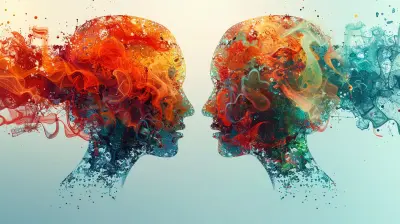Exploring the Benefits of Group Therapy for Mental Health
22 December 2024
In a world that often feels isolating, finding connections with others who are going through similar struggles can be a powerful remedy. That's where group therapy steps in. Whether you're dealing with anxiety, depression, trauma, or other mental health issues, group therapy has become an increasingly popular treatment option. But what exactly makes group therapy so beneficial? And why should you consider it as part of your mental health journey?
Well, I'm glad you're here because we're about to dive deep into the benefits of group therapy for mental health. We'll break down how it works, what you can expect, and, most importantly, why it might be the missing piece in your overall well-being.

What is Group Therapy?
Before we get into the benefits, let’s first clarify what group therapy is. Group therapy, as the name suggests, is a form of psychotherapy where one or more therapists work with a small group of people at the same time. Usually, groups consist of six to twelve individuals who meet regularly. These sessions are guided by a trained therapist and focus on open communication, where members discuss their feelings, experiences, and challenges.Unlike individual therapy, where it’s just you and the therapist, group therapy offers a shared space. You’re not alone in your journey, and there's something incredibly healing about realizing that other people are going through similar struggles.
Different Types of Group Therapy
It's also worth noting that group therapy isn't one-size-fits-all. There are different kinds, depending on the focus:- Psychoeducational Groups: These groups focus on providing education about specific mental health issues, such as anxiety, depression, or addiction, and teaching coping mechanisms.
- Support Groups: These are more informal and provide emotional support among members dealing with similar issues.
- Cognitive Behavioral Groups: These groups use cognitive-behavioral therapy (CBT) principles, helping participants challenge and change harmful thought patterns.
- Interpersonal Process Groups: These groups emphasize relationships and communication, helping members better understand how they interact with others.
Now that we’ve got the basics covered, let’s talk about the real reason you're here—the benefits of group therapy.

1. You're Not Alone: The Power of Shared Experiences
One of the most significant advantages of group therapy is the realization that you are not alone in your struggles. Often, mental health issues can make us feel isolated, as though no one else understands what we're going through. But in a group setting, you get to hear from others who are dealing with similar challenges, whether it's depression, anxiety, or something else.The relief that comes from knowing others are in the same boat can’t be overstated. It’s like a weight is lifted off your shoulders when you realize, "Oh, it's not just me." This sense of shared experience can be incredibly validating and healing. It reduces feelings of isolation and loneliness, two emotions that can worsen mental health conditions.
Example:
Imagine someone grappling with social anxiety. In a group therapy session, they might meet others who are also anxious in social settings. Hearing stories that mirror their own experience can feel like a lightbulb moment, letting them know they’re not broken or weird; they’re just human.
2. Learning from Others: A Collective Wisdom
Ever heard the saying, “Two heads are better than one”? Well, in group therapy, you’ve got multiple heads working together. Group therapy creates a unique learning environment. Not only do you get insights from the therapist, but you also learn from the personal experiences and strategies of other members.For instance, someone in the group might share a coping mechanism that has helped them manage their anxiety. Another person might offer an eye-opening perspective on how they’ve dealt with a similar issue. The sheer diversity of thought and experience in the room provides a wellspring of knowledge that you can tap into.
Example:
In a group for individuals dealing with depression, one member might share how they've managed to establish small daily routines that help them get through the day. Another member might explain how they've used journaling as a tool to monitor their mood. These shared coping mechanisms can be incredibly useful to others who might not have considered these approaches before.
3. The Power of Accountability
Let’s face it: change is hard. Whether it's trying to kick a bad habit, adopt healthier thinking patterns, or tackle long-standing emotional issues, staying on track can be tough. That’s where the magic of group dynamics comes into play.In a group therapy setting, you’re not just accountable to yourself—you're accountable to the group. Knowing that others are rooting for you and will check in on your progress can provide extra motivation to stick with the work. It’s one thing to let yourself down, but it’s a whole different ballgame when you feel like you’re letting down a group of people who care about your success.
Example:
Let’s say you’re working on managing your anger. In group therapy, you might share a goal to use breathing techniques the next time you feel your anger rising. When you come back to the group, they’ll ask you how it went. This creates a sense of accountability, making it more likely that you’ll follow through on your goals.4. A Safe Space to Practice Social Skills
For some people, especially those dealing with social anxiety or interpersonal issues, group therapy serves as a safe environment to practice social skills. It’s like a mini-lab where you can test out new ways of interacting with others without the fear of judgment.The group setting encourages individuals to communicate, express themselves, and even confront difficult emotions in a supportive environment. You might start to notice patterns in your interactions, such as difficulty expressing anger or fear of rejection, and the therapist can help guide you through these realizations.
Example:
If someone struggles with assertiveness, group therapy gives them the chance to practice being more assertive in a safe space. They might find it hard to speak up at first, but over time, with encouragement from the group, they can build confidence in their ability to express their needs.
5. Building Empathy and Understanding
Group therapy doesn’t just help you with your own issues—it can also foster a greater sense of empathy. As you listen to others’ stories, you start to see the world from different perspectives. This can help reduce judgment, not just toward others but also toward yourself.For instance, hearing someone else talk about their struggle with perfectionism might make you realize that you’ve been too hard on yourself about your own mistakes. In turn, this can lead to greater self-compassion, which is a crucial component of mental health.
Example:
In a group focused on anxiety, you might hear someone talk about how their anxiety manifests as a fear of failure. You might suddenly realize that you’ve been experiencing something similar but never recognized it for what it was. This shared understanding fosters empathy and can lead to deeper personal insights.6. Cost-Effective Therapy Option
Therapy can be expensive, and not everyone has the financial resources to afford individual sessions. Group therapy often comes at a lower cost compared to one-on-one therapy, making it a more accessible option for many people.Because multiple people are sharing the cost of the therapist's time, group therapy is generally more affordable. This allows more individuals to access mental health care, especially those who might otherwise be priced out of traditional therapy.
7. Developing Long-Lasting Relationships
While it may not be the primary focus, group therapy often leads to the development of meaningful relationships. The bond that forms between people who share their deepest feelings and struggles can be incredibly strong. Some group members even stay in touch after the sessions have ended, providing ongoing support for each other.Example:
For someone who feels isolated in their mental health struggles, these relationships can be transformative. It’s not uncommon for group members to become trusted confidants, offering support that extends beyond the therapy room.8. A Different Perspective from the Therapist
In individual therapy, the therapist’s focus is squarely on you. While this is valuable, it can sometimes lead to tunnel vision. In group therapy, the therapist has the advantage of observing how you interact with others. They can offer insights into how your patterns of behavior affect your relationships, something that’s harder to spot in one-on-one sessions.The therapist can also guide group discussions in a way that helps everyone gain deeper insights, not just about their own issues but about how interpersonal dynamics play a role in mental health.
Is Group Therapy Right for You?
So, now that we've covered the many benefits of group therapy, you might be wondering, "Is this the right choice for me?"Group therapy can be especially helpful if you’re dealing with issues like:
- Social anxiety
- Depression
- Trauma
- Addiction
- Relationship difficulties
- Grief or loss
However, it's important to note that group therapy isn't for everyone. If you're dealing with more severe mental health issues or feel uncomfortable sharing in a group setting, individual therapy might be a better fit. But if you’re open to sharing and learning from others, group therapy could be a powerful tool in your mental health journey.
Conclusion: The Collective Power of Healing
The bottom line? Group therapy offers benefits that you simply can’t get in individual therapy. From the power of shared experiences to the accountability and collective wisdom of the group, it provides a unique space for healing and growth. Whether you're looking to practice social skills, develop empathy, or simply feel less alone, group therapy can be a valuable part of your mental health toolkit.If you’re curious, why not give it a try? After all, you’ve got nothing to lose—and potentially, a lot to gain.
all images in this post were generated using AI tools
Category:
Mental Health EducationAuthor:

Jenna Richardson
Discussion
rate this article
11 comments
Thornewood Coffey
What a wonderful exploration of group therapy! It’s inspiring to see how shared experiences can foster healing and connection. Thank you for shedding light on such an important aspect of mental health!
February 1, 2025 at 4:19 AM

Jenna Richardson
Thank you for your kind words! I'm glad the article resonated with you and highlighted the power of shared experiences in group therapy.
Owen Harmon
Thank you for this insightful article! It's heartening to see the power of group therapy highlighted. Personal connections and shared experiences can truly transform the healing journey for so many. Grateful for your work!
January 27, 2025 at 4:29 AM

Jenna Richardson
Thank you for your kind words! I'm glad you found the article insightful and resonate with the importance of personal connections in the healing process.
Indie Gilbert
Group therapy offers invaluable support and shared experiences, helping individuals feel less isolated while promoting healing and personal growth. It's powerful.
January 23, 2025 at 5:28 AM

Jenna Richardson
Thank you for highlighting the importance of group therapy! It truly fosters connection and growth, making a significant impact on mental health.
Astralis Thomas
This article highlights the invaluable benefits of group therapy for mental health, such as fostering connection, reducing isolation, and offering diverse perspectives. It effectively emphasizes how shared experiences can facilitate healing and enhance emotional resilience among participants. Well done!
January 19, 2025 at 5:04 AM

Jenna Richardson
Thank you for your thoughtful feedback! I'm glad you found the article effective in highlighting the benefits of group therapy.
Kirk Ward
Group therapy fosters connection and support effectively.
January 12, 2025 at 5:10 AM

Jenna Richardson
Thank you! I'm glad you found the article highlights the importance of connection and support in group therapy.
Rina Sharp
This article on group therapy piques my curiosity! It’s fascinating how shared experiences can foster healing and connection. I wonder, what specific benefits have participants reported? Are there particular types of group dynamics that enhance these positive outcomes? Exploring these questions could deepen our understanding of collective healing in mental health!
January 1, 2025 at 5:35 AM

Jenna Richardson
Thank you for your interest! Participants often report benefits such as increased support, reduced feelings of isolation, and enhanced coping skills. Positive group dynamics, like trust and openness, play a crucial role in fostering these outcomes. I appreciate your curiosity about exploring these dimensions further!
Skyler Hubbard
Together we heal; isolation only deepens the struggle.
December 28, 2024 at 5:28 PM

Jenna Richardson
Absolutely! Group therapy fosters connection and support, making healing a shared journey.
Gunnar McTavish
Group therapy offers a unique blend of support, shared experiences, and diverse perspectives that can enhance individual healing. It fosters a sense of belonging and reduces feelings of isolation, reminding participants that they are not alone in their struggles, ultimately promoting growth and resilience.
December 25, 2024 at 3:32 PM

Jenna Richardson
Thank you for highlighting the powerful benefits of group therapy! It truly creates a supportive environment that fosters connection and individual growth.
Lys Stevens
Group therapy: where the power of we outweighs the weight of me. Sharing struggles and victories fosters connection, reduces isolation, and unveils perspectives often hidden in solitude. It’s not just about healing; it’s about thriving together. After all, mental health isn’t a journey meant to be traveled alone.
December 25, 2024 at 5:22 AM

Jenna Richardson
Absolutely! Group therapy truly emphasizes the strength found in community, making the journey towards mental health a shared and enriching experience.
Petra Sanchez
Group therapy fosters connection and support, enabling individuals to share experiences and learn from one another. Its collaborative environment enhances self-awareness, reduces isolation, and promotes personal growth, making it a powerful tool for improving mental health.
December 23, 2024 at 3:36 PM

Jenna Richardson
Thank you for highlighting the key benefits of group therapy! Your insights on connection, support, and personal growth truly capture its transformative potential for mental health.
Bellamy Jennings
Group therapy fosters connection, shared experiences, and support, enhancing individual growth and healing journeys.
December 22, 2024 at 5:50 AM

Jenna Richardson
Thank you for highlighting these key benefits! Group therapy truly cultivates a supportive environment that fosters connection and personal growth.
MORE POSTS

How to Offer Emotional Support Without Overstepping Boundaries

The Psychology of Gratitude: How Being Thankful Changes Our Behavior

The Power of Positive Reinforcement in Shaping Behavior

The Impact of Divorce on Child Psychology and Well-Being

How Group Therapy Builds Emotional Intelligence

The Influence of Peer Pressure on Adolescent Decision Making

Bipolar Disorder in Adolescents: What Parents Should Know

The Power of Reciprocity in Building Strong Social Connections